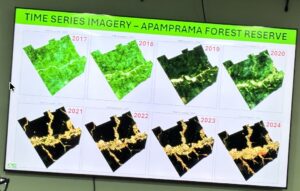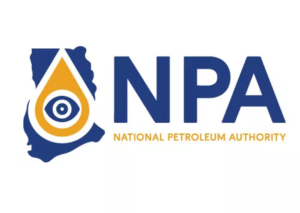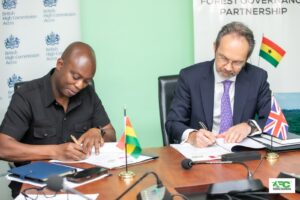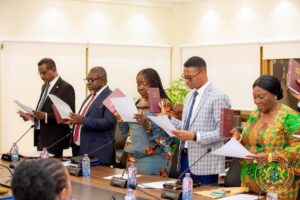
Photo: General Secretary Justin Kodua and National Organiser Henry Nana Boakye in deep discussion
• Delegates Slept in Buses and Dormitories, Big Men Slept on the Budget
In a jaw-dropping display of fiscal recklessness, and at a moment of intense political soul-searching, the New Patriotic Party (NPP) finds itself grappling with a deepening internal crisis—not merely of ideology, but of credibility.
Intercepted documents from the party’s recently concluded Annual Delegates Conference reveal a budget of over GH₵16 million for a single-day event, sparking widespread concerns over financial propriety, misplaced priorities, and growing disenchantment among the grassroots.
For a party that is struggling to pay staff stipends just months after leaving office, the spending spree smacks of extravagance.
Behind the scenes, it appears to be a feast for a select few—a looting spree cloaked in party colours and senseless applause. The numbers don’t just scream wastage—they bleed betrayal.
The conference, which lasted only a day, has ignited controversy, with internal documents pointing to exorbitant allocations for accreditation cards, transport, media, accommodation, and refreshments, often with little or no evidence of corresponding delivery.
The timing of the expenditure, coming so soon after the party’s electoral defeat and amid unresolved salary arrears, has intensified allegations of fiscal indiscipline and deep-rooted structural dysfunction, widening the rift between leadership and the rank and file.
SHOCKING BREAKDOWN: NUMBERS THAT RAISE MORE QUESTIONS THAN ANSWERS
A closer examination of the leaked expenditure breakdown from the NPP’s Annual Delegates Conference reveals startling inconsistencies and a pattern of fiscal opacity that has left many within the party disillusioned.
• GH₵1.2 million for accreditation cards:
The party reportedly allocated GH₵1.2 million to print 9,820 accreditation tags—an average of GH₵122 per card. Insiders familiar with the materials described them as basic laminated passes, raising serious concerns about procurement transparency and whether due diligence was followed in awarding the contract.
• GH₵2 million in “delegate support”—but who received it?
A total of GH₵2 million was supposedly disbursed to support 5,219 delegates and 255 TESCON branches across the country. Yet, multiple reports from regional coordinators and constituency executives indicate that most delegates received no such funds. The gap between the budgeted figures and on-the-ground realities has deepened suspicion of misallocation or redirection of resources.
•
In contrast, party financiers stepped in with separate personal donations:
o Former Vice President and flagbearer Dr Mahamudu Bawumia reportedly provided GH₵10,000 to each of the 276 constituencies, amounting to GH₵2.76 million.
o Agric Minister Bryan Acheampong is said to have distributed GH₵1,000 to each delegate, totalling an estimated GH₵4.67 million.
o Businessman and former presidential hopeful Kennedy Agyapong allegedly contributed GH₵4 million directly to the party.
These contributions, though separate from the official conference budget, underscore the question: What happened to the party’s GH₵2 million earmarked for delegates?
GH₵1 million for media and communications:
Despite the sizeable allocation, media presence at the event was notably thin and poorly coordinated. A TESCON representative described the effort as “invisible PR,” with no discernible outreach or campaign strategy to justify the expense.
GH₵2.5 million for catering:
The party’s budget provided GH₵2.5 million to feed approximately 7,000 attendees over three days. However, numerous delegates report being served food only on Friday night and Saturday, 19th October—raising doubts about the scale of catering provided and where the remainder of the funds went.
GH₵1.8 million for accommodation and security:
Despite the substantial allocation, complaints abound. Several delegates were left to sleep in buses, classrooms, or had to secure their own accommodation. The mismatch between the budget and actual conditions on the ground has fuelled further allegations of financial mismanagement.
GH₵4 million on transportation:
According to internal figures, GH₵4 million was spent on transporting approximately 17 individuals from each of the 276 constituencies, averaging GH₵766 per person. Yet accounts from delegates suggest cost-saving measures were employed, with one bus reportedly assigned to every three constituencies. This raises concerns about inflated costs and potential financial leakage.
GH₵240,000 for leadership welfare—vanished?
A separate GH₵240,000 allocation was meant to cater for National Executives, Directors, and members of the Council of Elders. However, interviews with several top officials suggest they were neither informed of nor received any such support, leading to renewed calls for an independent financial audit of the entire event.
ANATOMY OF A SYSTEMIC FAILURE
Several senior figures within the New Patriotic Party (NPP), speaking on condition of anonymity, have characterised the recent Annual Delegates Conference as a “choreographed show of strength,” staged more for optics than for genuine party introspection or organisational renewal.
“The issue isn’t just about the money,” a former regional officer remarked. “It’s about the message it sends—that the leadership remains tone-deaf to the party’s real challenges, especially the rising frustration at the grassroots level.”
For many insiders, the figures are not merely wasteful—they are symptomatic of a party whose internal architecture has shifted from reform-driven leadership to patronage-based survivalism. In this new reality, access to resources appears to have replaced competence as the currency of relevance.
WHY THEY WOULDN’T LET GO
There is growing consensus—among party reformists and independent observers alike—that the current leadership is more invested in consolidating its grip on power than initiating any meaningful restructuring. The motivation, many suggest, is not strategic vision but the retention of access to party resources and influence over internal processes.
“This scale of spending is not coincidental,” a governance analyst observed. “It points to a system calibrated to secure elite interests at the expense of long-term viability and electoral recovery.”
THE GRASSROOTS PAY THE PRICE
Perhaps the greatest burden is borne by the party’s rank and file—the campaigners, foot soldiers, and volunteers who risked personal security and spent from their own pockets during elections. Many of them now feel abandoned in the aftermath of the party’s electoral defeat, receiving little to no acknowledgement, let alone support.
“It’s become a party of insiders,” lamented a youth organiser from the Ashanti Region. “We are remembered when it’s time to mobilise—and forgotten immediately after.”
For these loyalists, the recent extravagance at the conference is not just a moral blow; it is an existential betrayal.
CALLS FOR AUDIT AND ACCOUNTABILITY
As confidence in the leadership continues to wane, pressure is mounting for a full financial audit of the conference budget. Several youth groups are reportedly preparing formal petitions to demand transparency around how the GH₵16 million was allocated and who benefited.
“This is no longer about numbers—it’s about integrity,” said a former regional treasurer. “If the party does not confront this issue head-on, it risks losing not just its electoral relevance, but its moral compass.”
A PARTY AT THE CROSSROADS
At a time when Ghanaian voters are increasingly demanding transparency, restraint, and responsibility in public life, the NPP’s internal spending habits may well undermine its attempts to rebrand as a credible opposition force.
If the leadership continues to evade scrutiny, the consequences may extend beyond disgruntled members to a full-blown crisis of legitimacy—one that could shape the party’s prospects for years to come.
The question now is not whether the NPP can afford another extravagant conference, but whether it can afford the mounting backlash.
Stay with The Hawk as we continue to follow the money—and expose those behind its trail.






